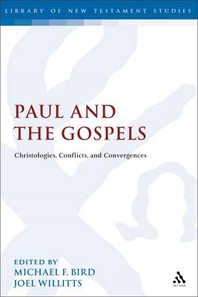 I. Mark: Interpreter of Peter and Disciple of Paul
I. Mark: Interpreter of Peter and Disciple of Paul
In the introduction, Dr. Bird explains that the Gospel of Mark derives its title from the Greek inscription ΚΑΤΑ ΜΑΡΚΟΝ. He believes this title is derived from the name of a certain John Mark who’s found in the New Testament (two times in Acts, three times in the Pauline corpus, once in Peter). His view is that it is reasonable to understand the author of this gospel to have been the one time road companion of Paul and, later, the scribe of Peter.
Next he turns to the history of scholarship in regards to Paul in the Gospel of Mark. He says there have been basically two options 1) Paul influenced Mark in his Gospel 2) Peter influenced Mark in his Gospel. Dr. Bird does not believe that the evidence of the Gospel of Mark leads to either of these two conclusions. Instead, he believes that the evidence is best interpreted as something like a synthesis of these two opposing ideas:
“The Gospel of Mark points to an early synthesis of Peter and Paul: Petrine testimony shaped into an evangelical narrative conducive to Pauline proclamation.”
II. Gospel of Mark as Petrine testimony
Here Bird remarks that there is a problem with proving any theory that claims the Gospel of Mark relies on Peter’s testimony. The problem is that there is very little authentic Petrine literature that can be used to test any theories of supposed influence. While lack of abundant literature is a problem, he does not think it is an insurmountable fact. He then notes why some scholars have doubted the apostle Peter’s influence on Mark’s Gospel. He lists the four main reasons for this doubt as being:
- Mark was probably derived from multiple sources and traditions.
- Mark is not the most Petrine gospel.
- The Gospel of Mark contains a polemic against Peter.
- The testimony of Papias is the only reason scholars have for postulating a Petrine tradition behind Mark.
After noting the traditional reasons for doubting Peter’s influence on Mark, Bird then gives his reason for doubting these propositions:
- Richard Bauckham has shown that the Gospel of Mark speaks of Peter at the beginning and end of the Gospel. This is an example of an ancient technique called inclusio, which was used to indicate the source for eyewitness accounts.
- Noting the work of other scholars, Bird claims that Peter, “is the most dominating personality among the disciples and Mark.”
- Bird claims that two things in the Gospel of Mark indicate that the gospel does operate from Peter’s viewpoint: (a) Peter is a round character in Mark’s Gospel in that he acts as antagonist and protagonist in the plot. (b) The third person plural verbs and Mark can easily be switched to first person, which, indicates a possible trace of personal testimony.
- Finally, he claims that there is the same narritival pattern in Peter’s speech in Acts 10 and in the Gospel of Mark. This is, in his opinion, enough evidence for a scholar to postulate Peter’s influence on the Gospel of Mark without using Papias’s testimony.
After giving us his negative responses to the scholars who doubt Peter’s influence on the Gospel of Mark, which has been the historical explanation of the title ΚΑΤΑ ΜΑΡΚΟΝ, he then moves on to give us a positive construction of commonalities between Mark and Paul.
a. Theology of the Cross
When it comes to preaching the cross bird claims that this, “was a feature of general Christian proclamation according to Acts.” He even notes that he doubts any earlier forms of Christianity existed that did not, “assign a significant place of some kind to the cross of Jesus in their identity forming-narrative, ethics and theology.” Even though he considers the proclamation of the cross an important aspect of identity formation in for all of Early Christianity, he goes on to claim that Mark and Paul can be compared by their, “centrality that they both assigned to the cross of Jesus and the definitive saving event performed by the God of Israel.”
b. Salvation
As for this similarity, Bird notes that all of Early Christian writings appears to share an emphasis on salvation, but, he believes that the two, “share, more acutely with each other than with other Christian groups.” The first acutely shared aspect of salvation is the use of the term εὐαγγέλλιον. He notes that many Christians in the first century used this term but some used it differently (although, he gives only one example found in Revelation 14:6). He then demonstrates that both Paul and Mark used the term in four distinct ways: (a) they speak in some way of a beginning, (b) they attach this term with God, (c.) the term is connected to discipleship, (d) the term is connected to the Gentiles (e) individuals may be associated with preaching the gospel.
The second shared feature of salvation is in the use of the term “redemption.” On this point he claims that Paul and Mark used this term, or better the accompanying phrase, in the same way (Mk 10:45; Rom 5:8). The third area may be found in how salvation relates to the Gentiles. He claims that both Mark and Paul’s writings share the “same social context,” i.e., the Gentiles have been included in the restoration of Israel.
c. Attitude to the Law
Before getting too far into this aspect of similarity, Bird notes, “ there is surely no topic of Pauline theology so perplexing and so baffling as the apostle Paul in the Law.” He goes on to claim that both Paul and Mark share the same attitude toward the law which is best summed up in this quote, “Paul’s Law free gospel is really a proselytism free gospel since his antithetical remarks about the law pertained primarily to instances where Gentile believers are compelled to be circumcised and adopt the Jewish way of life.” He then goes on to note that he disagrees with Crossley’s (who wrote the book’s previous article) interpretation of 7:19. Bird believes that this text is best understood as opening, “the possibility of some persons eating food that some others considered unclean.” he does not believe the episode with Peter in Acts 10 should be interpreted as opening up “culinary licence.”
IV. Conclusion and Appendix
In the conclusion Bird states, “Even if the Gospel of Mark was not written by Cyprian Jewish Christian John Mark, the document is very probably indebted to Peter and tradition and exhibits a pro-Pauline theological texture.” He then attaches an appendix to the article where he discusses the reasons for believing that the title of the Gospel was meant to indicate that a person named Mark was the author.




Hi.Dan.
Enjoy this summary. Do you know where I might get my hands on the whole chapter.None of the libraries I contacted in SA. has it?